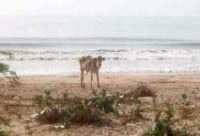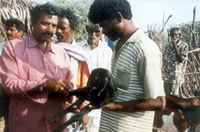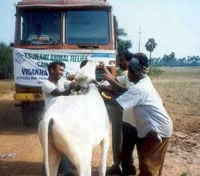Tsunami Reports
Tsunami animal relief report - January 21st, 2005
For tsunami effected animals covering four districts (from Uppada to Ongole) of the province of Andhra Pradesh on the east coast of India up to 400 kms from our home base in Visakhapatnam.
Our team consists of:
Rajsekhar - Deputy Shelter Manager and Joint Secretary, VSPCA
Dr. Vellavan - Shelter Vet, VSPCA,
AdiBabu - Animal Helper, VSPCA,
Rayudu - Business man (supplies dry hay) and our executive member and the lorry driver and his cleaner
We are entirely indebted to Dr. Bosmat Gal of Boston, MA USA who gave up her own busy clinic to rush here as a visiting volunteer vet sponsored by Association of Vets for Animal Rights. Because she has been working at our shelter of 700 animals it allowed our vet who speaks the local dialects to go out in the teams.

Village Suryalanka. One of the many stranded totally malnourished cattle on or near the beach. Nearby plants are thorn ones that is a good natural protector of the sand beach but the cattle cannot eat. This one was given special feed and IV fluids. Obviously as this was untied because it is a male one which people seem it as useless. Ironically the valued female cows were tied and have died. Official reports told of 163 cow dead as per Animal Husbandry but our team has reached places where the department has not been.
Leaving from where our first team out of Vizag had been to Uppada the second team continued with more material and medicines which covers four major Districts of Krishna, Guntur, Prakasam and East Godavari. The team left to Machilipatnam first which was most hit as per reports. More than 20 villages were covered.
Most of the villages affected were those within 500 meters to 1 kms to the sea when the water came with huge velocity and height wrecking along its way from concretes to anything livings. Many people lost their lives and belongings and their livestock.
Most of the affected animals consisted of goats and cattle. Cats deaths were rare and while some dogs every other dog sensed and ran away. They sure seemed to prove that they remain quite intelligent to such disasters and escape. Goats died mostly as they were in proximity to the sea grazing on beach grass and they could not sense the impending danger or might not have recognised the uneasiness of the dogs who were far away to provide any signals.
Those goats that survived were found to be injured on the legs and behind and most goats suffering from swallowing of the sea water vomiting and loose motions that led to dehydration. They were all treated by our team throughout these villages. Infact half of the deaths have happened within a day. Our team helped them with all the necessary items and provided the needed counseling because as per reports neither Govt. team nor any govt. vet visited the areas for providing any help and these people just depend on their own methods.

A baby goat being bandaged at Rathanpu.
It is not easy to reach these villages as it is very very inaccessible and four wheelers are very difficult. No autos or taxis would come in. Very tough conditions. The effected animals in question are goats, buffaloes, few cows and progenies, few dogs and cats.
Dogs along the beach were fed by our team who did not have any owners but with all their intelligence and survival fitness have become a source of great good omen to the villagers. Dogs have escaped but they needed help towards food and water which they did not seem to be getting. And it is now important to use this good relationship to do the spay neuter and provide the vaccinations to the dogs as the villagers will protect them now.
Current totals are 26 dogs, 156 cattle, 237 goats, 9 cats looked after by our team.
Would like to mention as per the villagers of Machilipatnam the deaths would have been huge had not the dogs and goats were behaving in an abnormal manner and running away from the shore. One of the fishermen by name Mastan stands testimony to this also. This was the worst effected areas.

One of the cows at this village being examined though seemed healthy but no owner. Our lorry filled with feed in back.
They have reached to Ongole where another 15 villages needed to be covered and as per Nellore officials and people it is this stretch that is most affected and needs all the help. The four day Pongal holiday was on the way and nobody wanting to move at all we organised from Wednesday assessing the situation with the help of Nellore friends while providing another team from 24th with all the help needed to these areas.
Our objective is not to turn our back once the treatment and help is provided but continue to come back in regular time and maintain a relationship bridging the gaps between the animals and humans as one seemed dependent on the other for survival. We aim at ABC for dogs, veterinary camps with the goats and cattle. We are working with Foundation for Animals, Nellore in this respect also. Our next team will meet them at Nellore city on 24th Jan with best vehicle and staff.
So let us begin where the support is and where the people love the animals. For VSPCA it means more employment and more food and expenses. Our long term goal in some of the villages we have made inroads into is to do ABC (animal birth control) for dogs, veterinary camps for goats and cattle, community participation, and to achieve all this we also need to care about the villagers. It is highly ambitious but this is the opportunity I have been dreaming about – to bring animal welfare to all of our province of Andhra Pradesh and with all of the help I am getting to do what is possible. So as we starting with our neighbouring coastal villages as we are already there monitoring sea turtles and then we can continue where there are approachable people and animal welfare organizations to coordinate with.

